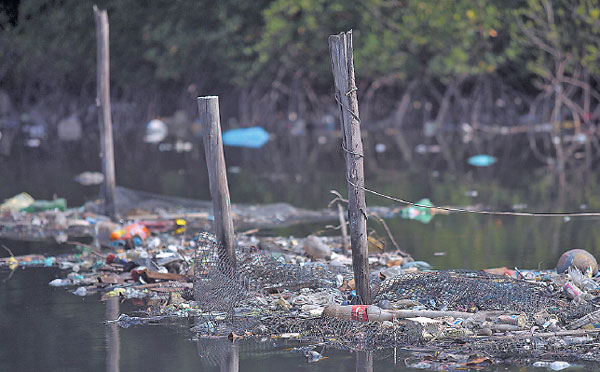Fishermen lament Rio's Olympic bay of filth
Updated: 2015-03-20 07:49
By Associated Press in Rio de Janeiro(China Daily)
|
||||||||
|
Trash is ensnared by a fence in Guanabara Bay in Rio de Janeiro, Brazil, in February. The Rio state government says it is working to reduce the bay's pollution by 80 percent in time for the 2016 Summer Olympics, but fishermen say they have seen no improvement. Leo Correa / Associated Press |
The day is still dark when Edmo Rodrigues da Costa sets out in his 6-meter fishing boat, maneuvering around clumps of trash and mounds of putrid sludge in the sewage-infested waters of Rio de Janeiro's Guanabara Bay.
For 30 years, Costa has set his nets in the bay that will host Olympic sailing events in 2016, hoping to catch sea bass, Atlantic bigeyes and shrimp. But year by year, the catches have diminished.
A good day out two decades ago would bring in $200 worth of fish. Today, Costa says a successful haul fetches $50. Sometimes, the floating refuse he finds is worth more than his catch.
He and about 30 other fishermen work out of the garbage-strewn docks under the Red Line highway, where the polluted waters of the Fundao and Cunha canals meet to flow into Guanabara.
The men blame industrial and sewage pollution for their empty nets. "We're here in this sewage, living here with this trash," Costa says. "Nothing is done to clean it up."
The fishermen bring their catches to a market on the dock, which sells fish at lower prices than supermarkets do.
Studies by biologists and health experts recommend that any fish from Guanabara Bay be "well cooked" to kill bacteria and viruses. But there have been no warnings from Rio's government against eating fish from the waters.
Rio state authorities say they're working to make good on a pledge made in Rio's Olympic bid to cut the bay's pollution by 80 percent.
But Costa and the other fishermen who see the water up close say they've witnessed little improvement. High tides bring in waves of garbage daily. They don't even bother trying to keep the docks clean.
Manuel Batista de Moraes, who at 76 no longer goes out on the water, makes his living mending fishing nets. It's a constant task, he says, because the trash rips nets apart.
"In the past we fished all kinds of species right here in this canal," he said. "Now it's just full of filth and more filth."

 Ming art sets Christie's high
Ming art sets Christie's high
 Stolen-phone bromance blossoms in China
Stolen-phone bromance blossoms in China
 Prince Charles, Camilla get royal tour of Washington
Prince Charles, Camilla get royal tour of Washington
 Should selfie sticks be banned?
Should selfie sticks be banned?
 Tunisians demonstrate against terrorism
Tunisians demonstrate against terrorism
 Five trends driving China's e-commerce surge
Five trends driving China's e-commerce surge
 Celebrations of St. Patrick's Day dye the world green
Celebrations of St. Patrick's Day dye the world green
 Ball pen artist makes his point
Ball pen artist makes his point
Most Viewed
Editor's Picks

|

|

|

|

|

|
Today's Top News
Sticking it to the selfie stick
China's eco-friendly companies stand to gain
China's global image on rise
US sends 'green' mission to China
3 killed in shooting at California convenience store
More Chinese film companies tap into Hollywood
Microsoft tackles China piracy with free upgrade to Windows 10
China's arms exports don't violate rules: Expert
US Weekly

|

|








